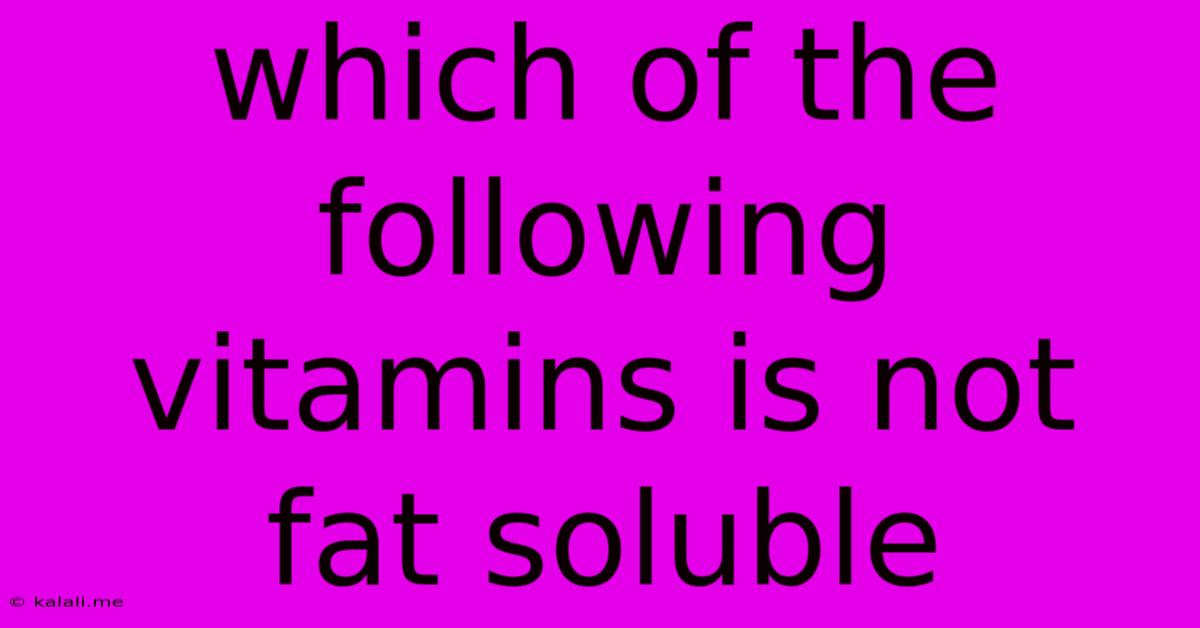Which Of The Following Vitamins Is Not Fat Soluble
Kalali
Jun 16, 2025 · 2 min read

Table of Contents
Which of the Following Vitamins is Not Fat-Soluble? Understanding Vitamin Classification
Vitamins are essential micronutrients crucial for various bodily functions. Understanding their solubility—whether they dissolve in fat or water—is key to comprehending their absorption, storage, and overall impact on health. This article will delve into the classification of vitamins, focusing specifically on identifying which vitamin among a given set is not fat-soluble. This knowledge is vital for anyone seeking a deeper understanding of nutrition and maintaining optimal well-being.
Fat-Soluble vs. Water-Soluble Vitamins: A Quick Overview
Before we identify the non-fat-soluble vitamin, let's briefly review the two main categories:
-
Fat-soluble vitamins: These vitamins dissolve in fat and are absorbed by the body with the help of dietary fats. They are stored in the liver and fatty tissues, meaning excess intake can lead to toxicity. The fat-soluble vitamins are vitamins A, D, E, and K.
-
Water-soluble vitamins: These vitamins dissolve in water and are readily excreted in urine. The body doesn't store them significantly, so regular intake is necessary. This group includes B vitamins (B1, B2, B3, B5, B6, B7, B9, B12) and vitamin C.
Identifying the Non-Fat-Soluble Vitamin
Now, let's address the core question. To determine which vitamin isn't fat-soluble from a given list, you simply need to check if it's one of the water-soluble vitamins listed above. For instance, if your options include Vitamin A, Vitamin C, Vitamin D, and Vitamin K, the answer is Vitamin C. It's a water-soluble vitamin, unlike the other options which are all fat-soluble.
Why Understanding Vitamin Solubility Matters
Knowing the solubility of vitamins is crucial for several reasons:
-
Absorption and Bioavailability: Fat-soluble vitamins require dietary fat for proper absorption, while water-soluble vitamins are absorbed directly into the bloodstream.
-
Storage and Toxicity: Fat-soluble vitamins are stored in the body, leading to the potential for toxicity with excessive intake. Water-soluble vitamins are generally not stored and excess amounts are excreted.
-
Dietary Considerations: Understanding solubility guides dietary choices. For example, individuals might need to consume fat-soluble vitamins with a fatty meal to maximize absorption.
-
Supplement Selection: Knowing vitamin solubility helps in choosing appropriate supplements and understanding potential interactions.
Conclusion
The classification of vitamins as either fat-soluble or water-soluble is a fundamental concept in nutrition. Understanding this distinction allows for better comprehension of vitamin absorption, storage, and potential toxicity risks. By recognizing that vitamins A, D, E, and K are fat-soluble, and that B vitamins and vitamin C are water-soluble, you can easily identify which vitamins from a given list are not fat-soluble. Remember to maintain a balanced diet rich in various fruits, vegetables, and whole grains to ensure adequate intake of all essential vitamins.
Latest Posts
Latest Posts
-
No Of Diagonals In A Pentagon
Jun 16, 2025
-
Friction Factor Formula For Laminar Flow
Jun 16, 2025
-
Select The True Statements About Sending Information On The Internet
Jun 16, 2025
-
List The Criteria For Effective Taxes
Jun 16, 2025
-
Electric Field Inside Non Conducting Sphere
Jun 16, 2025
Related Post
Thank you for visiting our website which covers about Which Of The Following Vitamins Is Not Fat Soluble . We hope the information provided has been useful to you. Feel free to contact us if you have any questions or need further assistance. See you next time and don't miss to bookmark.